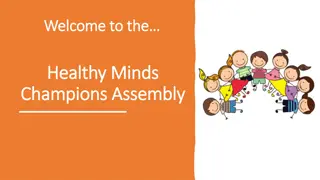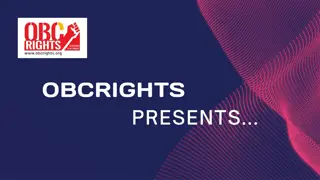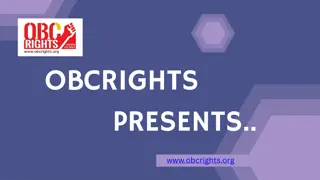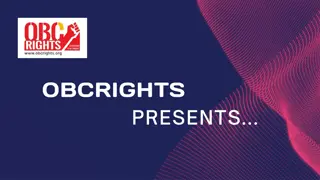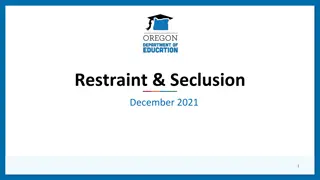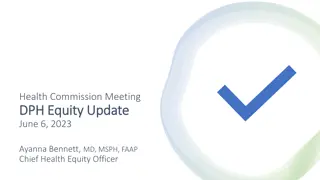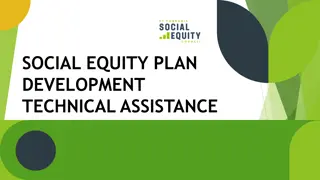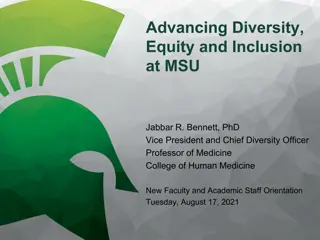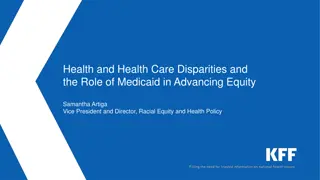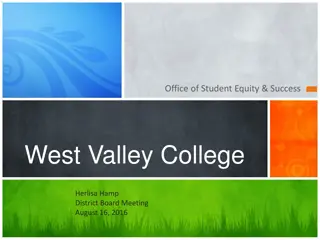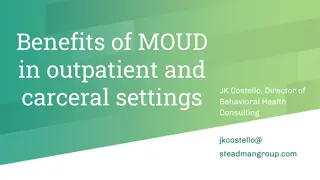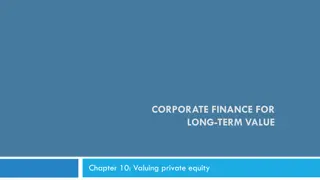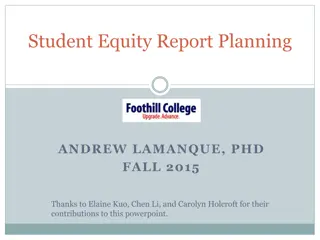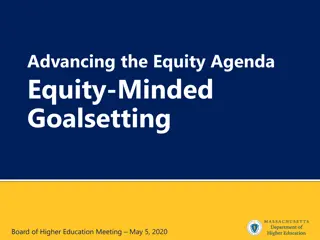Humanizing Students and Advancing Equity in Carceral Systems - Changing Hearts and Minds
Join us for a conversation about leading with equity to advance access, success, and support for justice-impacted students. Learn how serving these students aligns with Vision 2030 goals, benefits communities, and fosters advocacy. Discover the importance of person-first language and be inspired to contribute to changing attitudes towards carceral education.
Download Presentation

Please find below an Image/Link to download the presentation.
The content on the website is provided AS IS for your information and personal use only. It may not be sold, licensed, or shared on other websites without obtaining consent from the author. Download presentation by click this link. If you encounter any issues during the download, it is possible that the publisher has removed the file from their server.
E N D
Presentation Transcript
Humanizing Students and Advancing Equity in Carceral Systems - Changing Hearts and Minds
Presenting Team Ariana Flores, Pasadena City College Gail Ann Rulloda, Solano College Sarah Shepard, West Hills College Coalinga Kellie Nadler, California Community Colleges Chancellor s Office Jason Abhyankar, from Rising Scholars to Project Rebound Coordinator Juan Arzola, College of the Sequoias
Session Description Are you an equity champion? Are you a social justice warrior? Heeding the call to action included in Vision 2030, serving carceral impacted students, who are predominately people of color, should be at the forefront of your equity goals. Join us for a conversation about leading with equity to advance access, success, and support for justice impacted students and be inspired to use your voice to foster and cultivate a culture of advocacy at your college and in your community. 3
Session Outcome Attendees will: Develop an understanding of how serving justice-impacted students is an integral element to Vision 2030; Recognize the benefits of the Rising Scholars for the individual, their families, and communities; Cultivate a strong desire to advocate and support Rising Scholars, their faculty, and staff; and Be inspired to be involved with the ongoing and future efforts to change hearts and minds related to carceral education.
Grounding in Person-First Language Do say: Don t Say: Ex- or Former: Offender, Inmate, Convicted Felon, or Convict Violent Offender, Murderer, Robber Sex Offender Rapist, Molester, Pedophile Inmate, Offender, Prisoner** Criminal Justice System Parolee Returning Citizen^ Inmate or Offender Students Formerly incarcerated person or system impacted person Person in recovery or who has overcome addiction Person convicted of a violent felony Person convicted of a sex crime Incarcerated Person/People Criminal Legal System or Penal System Person on Parole or a Person Under Community Supervision A Person Recently Released 5 *Formerly Incarcerated College Graduates Network s Pledge
Vision 2030 - Justice Involved and Justice Impacted specifically called out EQUITY IN SUCCESS (1) Increase completion of a degree or certificate at a community college. (2) Focus on baccalaureate attainment (transfer and CC BA). (3) Workforce: Earning a living wage metric. EQUITY IN ACCESS Increase with equity, participation/enrollments for dual enrollment, justice involved individuals, veterans, working adults, low-income adults. EQUITY IN SUPPORT (1) Increase the number of Pell grant recipients and California College Promise Grant recipients. (2) Reduce units to Associate Degree for Transfer completion
Focus on Equity Statewide prison populations are highly racialized: Black and African Americans and Hispanics make up 28% and 46% of California s prison population (compared to 5% and 39% of Californians, respectively.) For individuals, participation in educational programs include: reduces the odds of recidivism by more than 40%, improves the odds of employment by 13% and improves post-release income by 8%-28%, depending on the focus of the educational programs. For the State of California, for every $1 spend on higher education in prisons, the state saves between $2 to $5 in reduced prison costs and lower recidivism, with one estimate suggesting that educating just half of California s prison population would save the state more than $65 million annually. (All data extracted from Vision 2030 report)7
Focus on Equity (cont.) Meaningfully increase post-incarceration income, further returning additional money to the state by increasing the productive tax base. Just as importantly, taking these steps as a system will help aid the ongoing transformation of California s criminal justice system away from a focus on punishment linked inexorably to high recidivism rates to a focus of rehabilitation and restoration, leading to better outcomes for the justice-involved and us all. (Data extracted from Vision 2030 report)
Destigmatizing justice-involved and justice-impacted experience Reducing Recidivism: Stigmatizing individuals who have been involved in the justice system can hinder their ability to reintegrate into society and lead productive lives; Equal Opportunity: Stigmatizing these individuals creates a barrier to their access to educational opportunities, which can perpetuate cycles of poverty and crime; Fostering Rehabilitation: Education is a key factor in the rehabilitation of justice-involved individuals. It can help them develop new skills, gain a better understanding of the consequences of their actions, and make positive life choices. 9
Destigmatizing justice-involved and justice-impacted experience (cont.) Building a More Inclusive Society: Stigmatizing justice-involved and justice-impacted individuals contributes to social divisions and discrimination; Economic Benefits: By providing education and support to justice- involved individuals, society can benefit from their potential contributions to the workforce Human Rights and Dignity: Stigmatizing justice-involved individuals can be seen as a violation of their human rights and dignity.
Humanizing justice-involved/justice-impacted students Restore dignity: The criminal justice system can strip individuals of their dignity, and many justice-involved students have experienced stigma and discrimination. Humanizing them helps restore their sense of dignity and self-worth, which is a fundamental aspect of their successful reintegration into society; Address trauma: Many justice-involved students have experienced trauma related to their involvement with the criminal justice system. Humanizing them allows educators to better understand and address these experiences, providing the necessary emotional and psychological support; 11
Humanizing justice-involved/justice- impacted students (cont.) Foster supportive communities and networks: By humanizing these students, educational institutions can create an inclusive and supportive learning environment. This environment encourages social connections, mentorship, and peer support networks that can be invaluable in their journey toward rehabilitation and success; and Self accountability: Humanizing justice-involved students does not negate accountability for their actions. Instead, it emphasizes accountability within a context of personal growth and rehabilitation. It supports a restorative justice approach that encourages individuals to take responsibility for their actions and make amends.
Common Questions asked of Rising Scholars Faculty Is there a difference between jail and prison? Are you worried or scared being inside ; what s it like? What are the challenges? What s the difference between a campus class and a prison class? 13
Storytelling and Sharing Experiences Changing Hearts and Minds
How to Get Involved A simple blurb to your syllabus: Example, If you are a student impacted by the carceral system through personal experience, or through a loved one who has been inside, please feel free to contact Rising Scholars, a (insert your college) community here to support your experiences. Note: a live link is always helpful. 15
How to Get Involved (#2) Invite us to host a Professional Development workshop on your flex day Learn about ways you can be a co-conspirator in your classes Become aware of real experiences of carceral impacted students in the community college system (the good, the bad and the ugly) Gain valuable skills to be helpful and not hurtful to our community Add a statement of interest to moderate courses for the program. Brush up on your humanizing language Underground Scholars Berkeley Humanizing Language Guide
How to Get Involved (#3) Learn about the strong relation to decreasing recidivism and attending college Degrees of Freedom Stanford Law School and Berkeley Law Report Johns Hopkins Spreading Hope to Those Deemed Hopeless Read on people impacted by incarceration in the US and why, you may be surprised: The Whole Pie Who is Really Behind Bars? Women Incarcerated Children and Mass Incarceration Together we can Change this with education! 17
Questions info@asccc.org
Resources Vision 2030 California Community Colleges Chancellor s Office: https://www.cccco.edu/About-Us/Vision-2030 Formerly Incarcerated College Graduate Network: https://ficgn.org/our- pledge/ https://www.law.berkeley.edu/files/DegreesofFreedom2015_FullReport. pdf https://biomedicalodyssey.blogs.hopkinsmedicine.org/2017/06/spreadin g-hope-to-those-deemed-hopeless/ https://www.prisonpolicy.org/reports/pie2023.html https://www.prisonpolicy.org/reports/pie2023women.html https://www.prisonpolicy.org/blog/2022/08/11/parental_incarceration/ https://undergroundscholars.berkeley.edu/blog/2019/3/6/language- guide-for-communicating-about-those-involved-in-the-carceral-system 19





